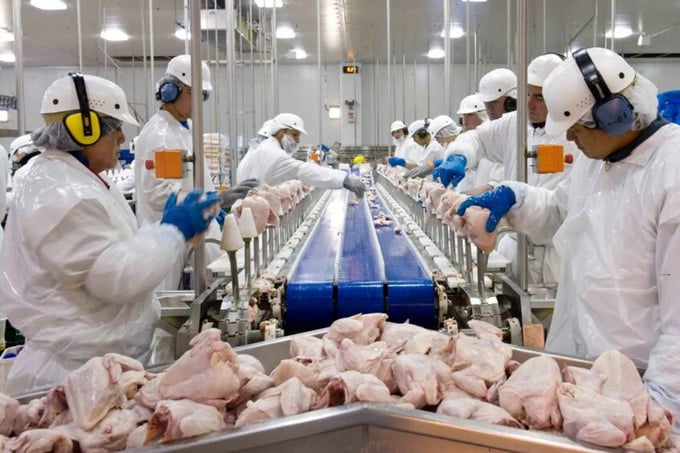December 31, 2025 | 04:57 GMT +7
December 31, 2025 | 04:57 GMT +7
Hotline: 0913.378.918
December 31, 2025 | 04:57 GMT +7
Hotline: 0913.378.918

'The average price was strongly influenced by the growth in shipments to high value-added markets, such as Japan,' said ABPA president Ricardo Santin. Photo: ASGAV.
According to data from the Brazilian Association of Animal Protein (ABPA), the average price of exported chicken reached US$2,089 in August, an 8.9% increase compared to the same period last year, when it was US$1,918.
This is the highest average price since August 2022, when US$2,106 per tonne was recorded. The World Health Organisation (WHO) declared the end of the Covid-19 pandemic in May 2023.
“The average price was strongly influenced by the growth in shipments to high value-added markets, such as Japan,” said ABPA president Ricardo Santin.
From January to August, the volume of chicken meat shipped reached 3.432 million tonnes, which is 1.8% lower compared to the same period last year, when it was 3.495 million tonnes.
Revenue recorded in the first 8 months of 2024 reached US$6.319 billion, which is 7.8% lower than the same period in 2023 when it was US$6.858 billion.
“Specific effects of Newcastle Disease contributed to the lower result, especially in shipments to China and Mexico. However, the monthly flow recorded so far remains in line with the average for the 12 months of 2023, stabilising around 430,000 tonnes,” he added.
In the breakdown by destination, the United Arab Emirates took the top spot, importing 39,200 tonnes from Brazil in August, a figure 17% lower in comparison to the same months last year.
By contrast, shipments to Japan grew by 32%, reaching 39,000 tonnes. This was followed by South Africa with 28,100 tonnes (+11%), Saudi Arabia with 26,900 tonnes (-28%), and China, now in fifth place, with 16,300 tonnes (-69%).
(PW)

(VAN) From emissions cuts to energy sovereignty, France’s president reflects on COP21's legacy.

(VAN) A Yale University poll from earlier this month says most Americans see climate change as playing a role in hurting prices and the cost of living.

(VAN) According to the National Food and Strategic Reserves Administration, this year's autumn grain entered the market earlier and boasts good quality.

(VAN) The Trade Policy and Strategy Office (TPSO) under the Commerce Ministry reported that exports in November 2025 were worth US$27.445 billion, expanding for a 17th consecutive month at 7.1%.

(VAN) Ukraine’s leading poultry processor and exporter, MHP, plans to kick off a trial production of insect meal in the first quarter of 2026, as revealed by Serhiy Melnychuk, scientific advisor to the chairman of MHP.

(VAN) Researchers have warned of the unexpected consequences of extremely hot, humid conditions during pregnancy.

(VAN) A group of Iranian scientists from the National Institute of Genetic Engineering and Biotechnology claimed that they have developed a technology that allows effective processing of poultry feathers into meal using a Bacillus strain.